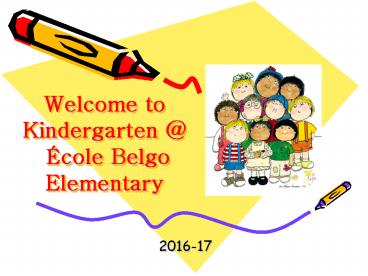Welcome to Kindergarten @ - PowerPoint PPT Presentation
1 / 30
Title:
Welcome to Kindergarten @
Description:
Awareness Safety School rules and expectations ... PowerPoint Presentation PowerPoint Presentation PowerPoint Presentation PowerPoint Presentation ... – PowerPoint PPT presentation
Number of Views:715
Avg rating:3.0/5.0
Title: Welcome to Kindergarten @
1
Welcome to Kindergarten _at_ École Belgo Elementary
- 2016-17
2
Welcome/Bienvenue
- Introduction of staff
- Getting to know you
3
Kindergarten TeachersLes professeurs
Mme Dack Mrs. Kline Mme Arseneau (no photo
available)
4
Office StaffLe personnel du bureau
Et moi
Ms. Gervais School Secretary
5
Library/La bibliothèque
Mrs. Gorjanc Teacher Librarian
Ms. Hansen Librarian Assistant
6
Learning Assistance Teachers
Mrs. Rippel
Mme Moore
7
Also
- School Counselor
- Music Teacher
8
Kindergarten / La maternelle
- is the bridge between home and school
- is where the foundation is built for future
- learning at school
- leads to success in future grades
- is where building independence in
- each child is an important first step
9
- Kindergarten experiences foster the development
of the whole child in a full day, play-based
learning environment.
10
Physical Development
11
Intellectual Development
12
Aesthetic ArtisticDevelopment
13
Social Responsibility
14
Whats important in Kindergarten?
- Social interactions
- Taking turns
- Using eye contact and polite words
- Speaking in complete sentences using a five year
old voice - Keeping hands and feet to self
15
- Communication skills
- Observing others before speaking
- Sitting quietly
- Facing the speaker
- Raising hand and waiting turn to speak
- Using polite words
16
- Developing independence
- Dressing independently (shoes, jackets, zippers,
snaps, buttons). - Packing, emptying and carrying own backpack.
- Being responsible for library books, show and
share items, notices and notes.
17
- Awareness
- Safety
- School rules and expectations
- Routines
- Differences, unique situations
18
- Academics / Les matières académiques
- Recognizing and naming letters
- Letter sounds
- Recognizing that letters make up words and words
make up sentences - Rhyming
- Recognizing numbers
- Counting beyond 20
- Patterning
19
- Skills
- Using scissors
- Correctly holding a pencil, crayons, felts
- Organizing materials, tidying up
- Waiting turns
- Lining up
- Transitioning from one activity to another
20
Gradual Entry
- First Week September 6, 7, 8 9
- Mini-conference parent, child, teacher (one
family at a time) - Second Week -
- Half days Monday and Tuesday (Sept. 12 13),
AM/PM - Full day Wednesday, Sept. 14
21
Class Set Up
- Two French Immersion classes
- One English class
22
What to bring?
- Healthy lunch
- 2 snacks
- Water bottle
- Backpack
- Inside shoes
- Change of clothes in a labelled Ziploc
- School fees (40)
23
Getting Your Child Ready
- Give your child little duties at home to help
develop self-confidence and responsibility - Read to your child and talk about the story
- Teach your child his/her address and phone number
- Teach your child to put on, take off and hang up
his/her clothing - Teach your child how to tie shoelaces
- Turn off the TV and talk, talk, talk! Encourage
development of a larger vocabulary through
conversations with your child. - Encourage your child to recognize and learn to
print his/her own name
24
Getting Your Child Ready
- Help your child to learn to wait his/her turn
- Encourage your child to
- Look at a person when that person is speaking
- Use good manners (please/thank you go a long
way!) - Tidy up after themselves
- Use words to explain how he/she is feeling
- Visit the Public Library regularly its free!
25
Arrive at school a little bit early
- AiE
so your child has a chance to play outside with
friends before class starts.
26
Read notices that are sent home from school.
27
Help your childs teacher to know about things
that happen at home that might affect your
childs day (especially changesin your family
situation)
28
Keep the office updated about changes to phone
numbers, address, caregiver information.
29
and Parents! You are your childs first and
most important teacher!Parent involvement
Student success!All parents form the Parent
Advisory Council (PAC) evening meetings each
month
30
We look forward to learning with you and your
child!































